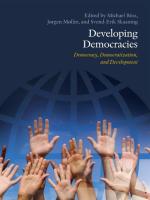Elections in Africa influence agricultural policies but not always in positive ways
During the 1990s, regular multi-party elections became the norm for most states in sub-Saharan Africa. Increasingly, Africans preferred democracy over the rule by one party, by one man or by the military. Today, African ruling elites must therefore win elections in order to legitimize their access to power.
However, we know relatively little about the effects of competitive elections on policy-making and implementation in Africa. Such knowledge is especially relevant in agriculture for three reasons: it provides the livelihood for a very large proportion of the population in sub-Saharan Africa; improved agricultural productivity is central for economic transformation and sustained poverty alleviation; and research prior to the 1990s has shown that policies to strengthen agriculture generally had much lower priority among ruling elites than securing cheap food for unruly urban populations. That is one major reason why agricultural incomes have not improved much for decades in most countries.
Has the emergence of competitive elections since the 1990s made political elites more responsive to the needs of African small-holders? That question is addressed in an article by Anne Mette Kjær and Ole Therkildsen, “Competitive elections and agricultural sector initiatives in sub-Saharan Africa”
We looked at the politics of four major government initiatives aimed at improving the production of palm oil in Ghana, sugar in Mozambique, rice in Tanzania and dairy products in Uganda.
We argue that decisions affecting a particular agricultural initiative are de facto made during the implementation rather than during the policy making process and that such decisions are primarily influenced by political incentives facing political elites.
Moreover, the main political incentives derive from the imperative to win elections to stay in power, as well as to obtain political financing in exchange for rents to specific groups. On basis of this we argue that competitive elections are likely to increase clientelism and patronage rather than reducing it.
Consequently, democratization provides very mixed incentives for political elites to push for the implementation of initiatives that can help to increase smallholder livelihoods. Although competitive elections may help to improve productivity and smallholder incomes (and help to win elections) in some circumstances, this may not be the most common outcome. At present the political conditions for sustained poverty alleviation through a broad based transformation of African agriculture may only exist in certain agricultural sectors – especially where producers have an influential position in that country’s political economy.
It is therefore not ‘more democracy’ as such that African countries ‘need’ in order to motivate its ruling elite to formulate agricultural policies that benefit smallholders. Sustained poverty alleviation and improvements in livelihoods require better organised producers with stronger technical and economic capacities that operate in the formal sector. These are important roots of the political influence of smallholders.
DIIS Experts


